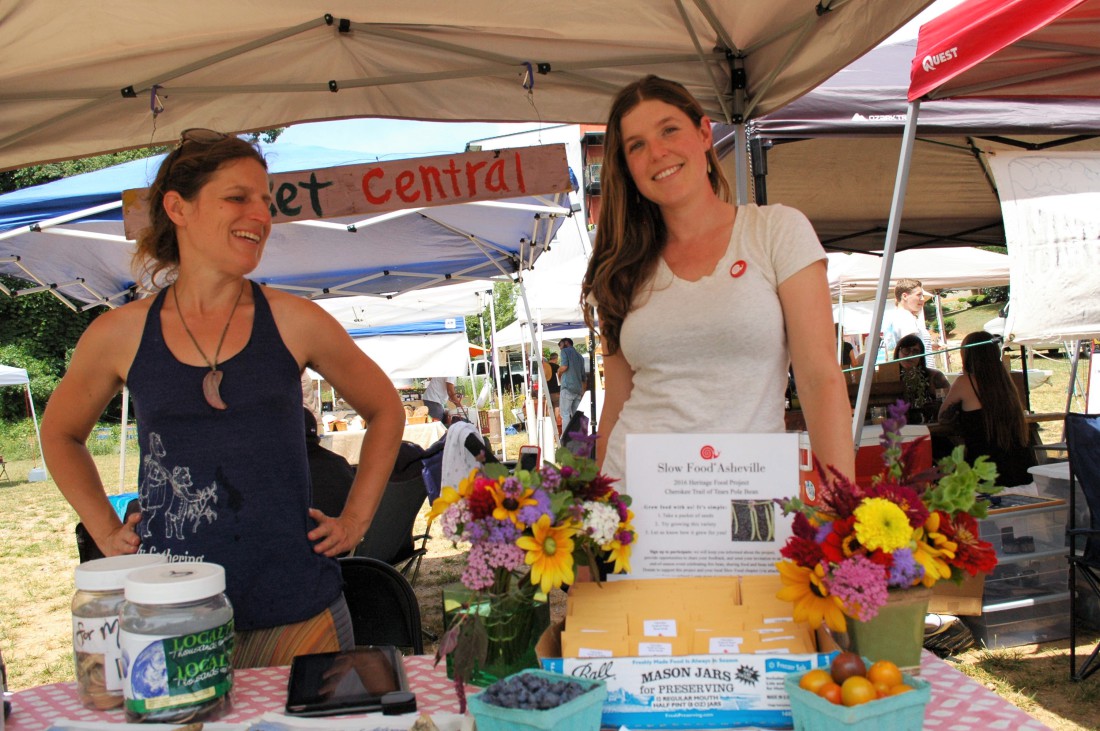For its inaugural Heritage Food Project in 2015, Slow Food Asheville celebrated a little-known but once-beloved sweet potato — the Nancy Hall. The organization distributed slips of the flavorful, white-fleshed tuber to a few dozen Western North Carolina farmers and gardeners who volunteered to grow, harvest and eventually cook it, all in the name of keeping a vanishing local food staple viable.
For its 2016 Heritage Food Project, the local chapter of Slow Food International will highlight the Cherokee Trail of Tears bean, an heirloom varietal that memorializes the forced relocation of the Cherokee people in the mid-19th century from their traditional lands to Oklahoma Territory.
“One reason we wanted to feature a bean [this year] is because beans can be planted anytime out of the danger of frost with much less planning than was required for a sweet potato crop, and [there are] decidedly simpler methods for harvest and preservation,” says Ashley Epling, a member of the board of directors of the local Slow Food International chapter. “After some research, our board narrowed a list of heirloom beans down to three locally grown varieties and allowed our community to cast votes deciding which bean variety to highlight this year.”
The green pods of this 6-inch pole bean can be snapped and eaten fresh, or its shiny, black seeds can be dried and cooked. The nonprofit Seed Savers Exchange organization’s website says one of its members, Dr. John Wyche of Hugo, Okla., donated the Cherokee Trail of Tears bean seeds to its collection in 1977. “It is thought that his Cherokee ancestors carried this heirloom bean with them on the Trail of Tears,” reads the web page’s history of the bean.
Historian and Slow Food Asheville board member Maia Surdam has spent some time researching the bean’s background, including a recent interview with Roy Lambert, a Cherokee seed saver, former educator and grower who has been farming vegetables since the 1940s. Lambert has grown many varieties of beans in his lifetime and has won first place with his bean displays at the annual Cherokee Indian Fair for 19 of the past 20 years.
“Mr. Lambert is familiar with the bean that Slow Food is promoting, although he knows it as the goose bean,” says Surdam. “He claims it is a very prolific bean that grows well around his home in the Cherokee area, although he does not know where it got its name.” Lambert, Surdam notes, has helped preserve many bean varieties by donating seeds to the Eastern Band of Cherokee Indians’ seed exchange program.
Those who would like to participate in the Cherokee Trail of Tears bean’s communitywide growing trial can sign up and claim a packet of seeds at any of several local locations (see sidebar) while supplies last. Sign-ups can also be done at slowfoodasheville.com. The chapter has a total of 250 seed packets to give away, and each packet contains enough seeds to plant a 10-foot row.
Once folks have grown and harvested their beans, Slow Food Asheville will distribute an online survey to collect observations, feedback, photos and recipes related to the bean. The project will culminate with a potluck party at the end of the growing season where participants can share dishes prepared with the bean, as well as stories about its cultivation.
“We welcome more folks to volunteer with the project, not only in growing the bean, but also in helping educate our community through contact with the Cherokee people and other seed-savers,” says Epling. “We seek to honor the cultural history as well as the culinary acclaim of this important food in our region.”




Before you comment
The comments section is here to provide a platform for civil dialogue on the issues we face together as a local community. Xpress is committed to offering this platform for all voices, but when the tone of the discussion gets nasty or strays off topic, we believe many people choose not to participate. Xpress editors are determined to moderate comments to ensure a constructive interchange is maintained. All comments judged not to be in keeping with the spirit of civil discourse will be removed and repeat violators will be banned. See here for our terms of service. Thank you for being part of this effort to promote respectful discussion.